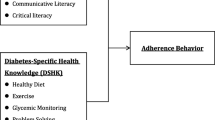Abstract
Diabetes is a prevalent health problem in developing as well developed countries. Previous study advocates for diabetes self-management education (DSME) among diabetics. In this study, we have examined the association of sociodemographics and technology use with health literacy among type 2 diabetic individuals. This exploratory cross-sectional study was performed by enrolling a convenient sample of 100 type 2 diabetes mellitus (T2DM) patients. Individuals of age 18 years or above were enrolled during regular outpatient visit to the diabetic clinic of Saveetha Medical College in Chennai, a metropolitan city in southern state of India in August 2013. A modified version of previously validated questionnaires was used for gathering information on sociodemographic characteristics, technology use assessments, diabetes-related information, health literacy, and health information-seeking behavior. Results of the study showed that majority of the individuals had received some form of diabetes education from their doctor at the time of diagnosis. However, 56 % of the participants had difficulty (sometimes to always) in understanding the health information provided by the healthcare professional. Individuals who had access to computer and Internet at home or work required less support for reading instructions, pamphlets, or other written material from the doctor or pharmacy. Individuals having access to technology had higher health literacy as compared to individuals with no access. Technology can act as potential enabler for improving the health literacy. Future research is warranted to identify most cost-effective, feasible, and accessible technology medium for providing diabetes self-care management education.


Similar content being viewed by others
References
Currie D. Major causes of disability, death shift around the globe: chronic diseases now taking the lead. Nation's Health. 2013;43(1):1–22.
Dwinger S, Dirmaier J, Herbarth L, Konig HH, Eckardt M, Kriston L, et al. Telephone-based health coaching for chronically ill patients: study protocol for a randomized controlled trial. Trials. 2013;14(1):337.
International diabetes federation. IDF Diabetes Atlas, 6TH edn. International diabetes federation [Internet]. 2013. [Cited 2014 March 14]. Available from: http://www.idf.org/diabetesatlas
International diabetes federation. About diabetes [Internet].2014. [Cited 2014 March 14]. Available from: http://www.idf.org/about-diabetes
WHO. Global status report on noncommunicable diseases 2010. World Health Organization, 2011. Available from: http://www.who.int/nmh/publications/ncd_report_full_en.pdf
WHO. Fact and figure about diabetes. World Health Organization, 2013. Available from : http://www.who.int/mediacentre/factsheets/fs312/en/
Diabetes epidemic in India. CADI research foundation [Internet]. 2014. [cited 2014 March 14].Available from: http://www.cadiresearch.org/topic/diabetes-indians/diabetes-in-india.
Muninarayana C, Balachandra G, Hiremath SG, Iyengar K, Anil NS. Prevalence and awareness regarding diabetes mellitus in rural Tamaka, Kolar. Int J Diabetes Dev Countries. 2010;30(1):18–21.
Somannavar S, Lanthorn H, Deepa M, Pradeepa R, Rema M, Mohan V. Increased awareness about diabetes and its complications in a whole city: effectiveness of the “prevention, awareness, counselling and evaluation” [PACE] Diabetes Project [PACE-6]. J Assoc Physicians India. 2008;56:497–502.
Funnell MM, Brown TL, Childs BP, Haas LB, Hosey GM, Jensen B, et al. National standards for diabetes self-management education. Diabetes Care. 2012;33 Suppl 1:S89–96.
Foster GD, Wadden TA, LaGrotte CA, Vander Veur SS, Hesson LA, Homko CJ, et al. A randomized comparison of a commercially available portion-controlled weight-loss intervention with a diabetes self-management education program. Nutr Diabetes. 2013;3(3):e63.
Mshunqane N, Stewart AV, Rothberg AD. Type 2 diabetes management: patient knowledge and health care team perceptions, South Africa. Afr J Prim Health Care Fam Med 2012, 4(1).
Shah A, Zargar SH, D'Souza C. Community level diabetes management through public private partnership initiative in Gujarat—results from Changing Diabetes® Barometer. J Soc Health Diabetes. 2013;1(2):86–9.
Osborn CY, Bains SS, Egede LE. Health literacy, diabetes self-care, and glycemic control in adults with type 2 diabetes. Diabetes Technol Ther. 2010;12(11):913–9.
Kumar N, Gupta N, Kishore J. Kuppuswamy’s socioeconomic scale: updating income ranges for the year 2012. Indian J Public Health. 2012;56:103–4.
Baker DW, Williams MV, Parker RM, Gazmararian JA, Nurss J. Development of a brief test to measure functional health literacy. Patient Educ Couns. 1999;38:33–42.
Hjelm K, Atwine F. Health-care seeking behavior among persons with diabetes in Uganda: an interview study. BMC Int Health Hum Rights. 2011;11(1):11.
Rani PK, Raman R, Subramani S, Perumal G, Kumaramanickavel G, Sharma T. Knowledge of diabetes and diabetic retinopathy among rural populations in India, and the influence of knowledge of diabetic retinopathy on attitude and practice. Rural Remote Health. 2008;8(3):838.
Jeppesen KM, Coyle JD, Miser WF. Screening questions to predict limited health literacy: a cross-sectional study of patients with diabetes mellitus. Ann Fam Med. 2009;7(1):24–31.
Bader A, Gougeon R, Joseph, L, Da Costa D, Dasgupta K. Nutritional education through Internet-delivered menu plans among adults with type 2 diabetes mellitus: pilot study. JMIR Res Protocol 2013, 2(2).
Acknowledgments
We thank all the study participants. We acknowledge the assistance of diabetes clinic staff of Internal medicine outpatient department.
Author information
Authors and Affiliations
Corresponding author
Ethics declarations
The study was approved by the ethics committee of the Foundation of Healthcare Technologies Society, New Delhi (IRB#FHTS/012/2013), and conforms to the provisions of the Declaration of Helsinki (as revised in Tokyo 2004).
Conflict of interests
The authors declare that they have no conflict of interests.
Rights and permissions
About this article
Cite this article
Ramasamy, D., Singh, A.K., Mohan, S.K. et al. Association of sociodemographics, technology use and health literacy among type 2 diabetic individuals living in an Indian setting: an exploratory cross-sectional study. Int J Diabetes Dev Ctries 36, 303–312 (2016). https://doi.org/10.1007/s13410-015-0444-7
Received:
Accepted:
Published:
Issue Date:
DOI: https://doi.org/10.1007/s13410-015-0444-7




